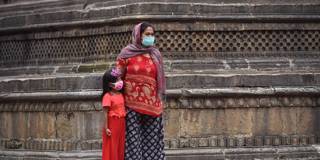OnPoint Subscriber Exclusive
The Big Picture brings together a range of PS commentaries to give readers a comprehensive understanding of topics in the news – and the deeper issues driving the news. The Big Question features concise contributor analysis and predictions on timely topics.

The Gendered Pandemic
Governments simultaneously trying to address the public-health and economic shocks caused by COVID-19 risk overlooking the immediate effects of the crisis on women and girls. How can policymakers mitigate these threats and foster longer-term progress toward gender parity?
In this Big Picture, Swedish foreign minister Ann Linde and her Spanish counterpart, Arancha González, argue that measures to tackle the COVID-19 crisis must address increasing risks to women and girls in the home, the health-care sector, and the labor market. Princeton University’s Beth English and Kelly Pike of York University suggest how policymakers can ease the current plight of women wage earners in developing and emerging economies – including in the global garment industry. And the World Bank’s Sandie Okoro and Paul Prettitore show how the pandemic may yet help to improve women’s access to justice, instead of widening existing gender-based legal inequalities.
The pandemic also threatens to reverse recent gains in child and maternal health, note the World Health Organization’s Tedros Adhanom Ghebreyesus, UNICEF’s Henrietta H. Fore, Natalia Kanem of the United Nations Population Fund, and Save the Children UK’s Kevin Watkins, who outline a four-pronged strategy to prevent this scenario. Likewise, Shannon Kowalski of the International Women’s Health Coalition explains why the crisis offers an opportunity to enhance sexual and reproductive health care for women and girls.
Finally, psychiatrist Raj Persaud notes that several of the countries that have tackled the pandemic most effectively are led by women. These female leaders’ success, he argues, stems not from traditional “feminine” qualities, but rather from the fact that women generally face a more demanding path to power than men.